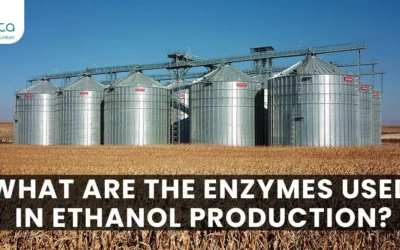Biofuels have emerged as a promising solution to combat climate change and reduce our dependence on fossil fuels. With advancements in technology, enzymatic solutions are revolutionizing the production of biodiesel, offering a more efficient and sustainable alternative. This article explores the basics of biofuels, the role of enzymes in biofuel production, and the potential future of enzymatic solutions in biodiesel production.
Understanding the Basics of Biofuels
Defining Biofuels and Their Importance
Biofuels are renewable energy sources derived from organic materials, such as crops, agricultural residues, and animal waste. They are seen as a crucial tool in the transition to a low-carbon economy due to their ability to reduce greenhouse gas emissions and mitigate climate change.
Unlike fossil fuels, biofuels are considered carbon-neutral, as the carbon dioxide released during combustion is absorbed by the plants during their growth cycle. This makes them an attractive alternative for transportation and energy generation, as they can contribute to a significant reduction in overall carbon emissions.
Furthermore, biofuels play a vital role in enhancing energy security by reducing dependence on imported fossil fuels. By promoting domestic production of biofuels, countries can strengthen their energy independence and reduce the risks associated with volatile global oil markets.
Moreover, biofuels have the potential to create new economic opportunities in rural areas by providing a market for agricultural products and by-products. This can help diversify income sources for farmers and stimulate rural development, contributing to overall economic growth and stability.
The Current State of Biofuel Production
Currently, biofuel production primarily involves the use of conventional methods, such as transesterification, which involves the reaction of vegetable oils or animal fats with alcohol to produce biodiesel. However, this process has some limitations in terms of efficiency and environmental impact.
Traditional biodiesel production requires high temperatures and pressures and often relies on chemical catalysts, which can result in the release of harmful byproducts and contribute to pollution. Additionally, feedstock availability and competition with food production raise concerns about the sustainability of conventional biofuel production.
As the demand for biofuels continues to grow, researchers and industry experts are exploring innovative technologies such as microbial fermentation and thermochemical conversion to improve the efficiency and sustainability of biofuel production. These advancements aim to address the limitations of traditional methods and pave the way for a more environmentally friendly and economically viable biofuel industry.
The Role of Enzymes in Biofuel Production
How Enzymes Work in Biofuel Production
Enzymes are natural catalysts that accelerate chemical reactions without being consumed in the process. In biofuel production, enzymes play a crucial role in breaking down complex organic materials into simpler components, which can then be converted into biofuels.
Enzymatic solutions for biodiesel production involve the use of lipases, which are enzymes that break down triglycerides present in oils or fats into fatty acids and glycerol. These components can then undergo further reactions to produce biodiesel.
Another key aspect of enzymes in biofuel production is their specificity. Enzymes are highly specific in their action, targeting particular chemical bonds or structures in the substrate molecules. This specificity not only increases the efficiency of the reaction but also reduces the formation of unwanted byproducts, leading to higher yields of the desired biofuels.
The Benefits of Enzymatic Solutions in Biodiesel Production
Enzymatic biodiesel production offers several advantages over conventional methods. Firstly, enzymes work under mild reaction conditions, requiring lower temperatures and pressures compared to traditional processes. This not only reduces energy consumption but also minimizes the production of harmful byproducts.
Furthermore, enzymatic solutions can be more selective, allowing for the use of a wider range of feedstocks, including low-quality oils and fats that would otherwise be unsuitable for conventional biodiesel production. This can help reduce competition with food production and increase the overall sustainability of biofuel production.
Moreover, the use of enzymes in biofuel production can lead to cost savings in the long run. While the initial investment in enzyme technology may be higher, the efficiency and selectivity of enzymes can result in lower production costs over time. This cost-effectiveness is particularly beneficial in the context of fluctuating oil prices and the growing demand for sustainable energy sources.
The Future of Enzymatic Solutions in Biodiesel Production
Predicted Advances in Enzymatic Solutions
As technology continues to advance, enzymatic solutions are expected to play a more significant role in biodiesel production. Ongoing research aims to improve the efficiency and stability of enzymes, allowing for faster and more cost-effective biofuel production.
Scientists are also exploring the potential use of genetically modified enzymes to enhance their performance and broaden the range of feedstocks that can be used. These advancements could lead to increased flexibility and scalability in enzymatic biodiesel production.
Furthermore, the integration of artificial intelligence and machine learning algorithms in enzyme engineering is opening up new possibilities for designing enzymes with tailored properties. By harnessing the power of computational tools, researchers can predict enzyme behavior more accurately and accelerate the development of novel biocatalysts for biodiesel production.
Potential Challenges and Solutions in Enzymatic Biodiesel Production
Despite the promising potential, enzymatic biodiesel production still faces some challenges. Enzymes can be expensive to produce and may require specific conditions for optimal performance. However, ongoing research and development aim to address these issues, seeking to optimize enzyme production processes and improve their stability and cost-effectiveness.
Moreover, the quest for sustainability in enzymatic biodiesel production has spurred interest in utilizing enzyme immobilization techniques. Immobilized enzymes offer enhanced reusability and operational stability, contributing to a more sustainable and economically viable biodiesel production process. Research efforts are focused on exploring innovative immobilization strategies to overcome mass transfer limitations and maximize enzymatic efficiency.
Additionally, the commercialization and widespread adoption of enzymatic solutions may require further investment in infrastructure and regulatory support. Collaboration between researchers, industry stakeholders, and policymakers will be crucial in overcoming these challenges and driving the future of enzymatic biodiesel production.
The Environmental Impact of Enzymatic Biodiesel Production
Comparing the Carbon Footprint of Enzymatic Biodiesel to Traditional Fuels
Enzymatic biodiesel production has the potential to significantly reduce carbon emissions compared to traditional fossil fuels. By utilizing organic waste materials as feedstock, enzymatic biodiesel production can contribute to the circular economy and minimize greenhouse gas emissions.
Furthermore, the use of enzymatic solutions can lead to higher conversion efficiencies and cleaner reactions, resulting in reduced environmental impact. The overall carbon footprint of enzymatic biodiesel is expected to be considerably lower than that of petroleum-based fuels.
Enzymatic biodiesel production also offers the advantage of promoting energy independence and reducing reliance on imported fossil fuels. This can enhance national security and create a more stable energy market, less susceptible to geopolitical tensions and price fluctuations.
The Sustainability of Enzymatic Biodiesel Production
Sustainability is a paramount consideration in biofuel production. Enzymatic biodiesel offers the advantage of using various feedstocks, including waste materials that would otherwise be disposed of. This reduces the need for dedicated farmland and avoids competition with food production, contributing to a more sustainable and environmentally friendly approach.
Additionally, enzymatic solutions can help optimize resource utilization and reduce waste generation. By extracting valuable components from organic materials, enzymatic biodiesel production can contribute to a more circular and sustainable economy.
Furthermore, enzymatic biodiesel production can play a crucial role in rural development by providing new revenue streams for farmers and fostering local economic growth. By creating opportunities for small-scale biodiesel production facilities, communities can benefit from job creation and increased investment in renewable energy technologies.
The Economic Implications of Enzymatic Biodiesel Production
The Cost-effectiveness of Enzymatic Biodiesel Production
The cost-effectiveness of enzymatic biodiesel production is a critical factor in its widespread adoption. While the initial costs of enzymes and specialized equipment may be higher than those of conventional methods, enzymatic solutions offer potential benefits in terms of energy efficiency, reduced waste, and improved product quality.
As technological advancements continue and economies of scale are realized, the cost of enzymatic biodiesel production is expected to decrease. Additionally, the ability to use a wider range of feedstocks can provide opportunities for cost savings and investment diversification.
Furthermore, the use of enzymes in biodiesel production can lead to a more sustainable and environmentally friendly process. Enzymes are biodegradable and can be reused multiple times, reducing the overall environmental impact of biodiesel production. This aligns with the growing consumer demand for eco-friendly products and can enhance the marketability of enzymatic biodiesel.
The Potential Market for Enzymatic Biodiesel
The market for biofuels, including enzymatic biodiesel, is steadily growing as governments and industries seek cleaner and more sustainable energy alternatives. The demand for renewable fuels and the potential for carbon credit incentives offer opportunities for investment and market expansion.
Enzymatic biodiesel can also find applications beyond transportation, including power generation and heating. Expanding the market reach and diversifying product applications can contribute to the long-term viability and profitability of enzymatic biodiesel production.
Moreover, the versatility of enzymatic biodiesel opens up possibilities for niche markets and customized products. Tailoring biodiesel blends to specific industrial or commercial needs can create value-added opportunities and premium pricing strategies. This flexibility in product development can attract a diverse customer base and establish a competitive edge in the biofuel market.
Conclusion
Enzymatic solutions hold great promise for the future of biodiesel production. With their ability to improve efficiency, reduce environmental impact, and enhance sustainability, enzymatic solutions offer a pathway towards a cleaner and more sustainable energy future.
While there are challenges to overcome and further research to be done, the ongoing advancements in enzymatic technology showcase the potential for a revolution in biofuel production. Embracing enzymatic solutions in biodiesel production could play a vital role in achieving our ambitious climate targets and shaping a greener future for generations to come.


